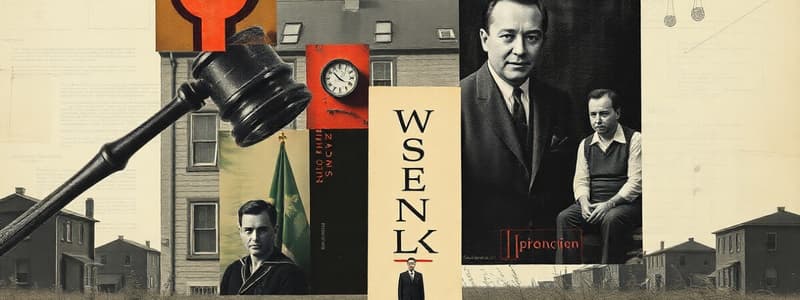Podcast
Questions and Answers
What type of expenses may be compensated under the rules of unjustified enrichment for immovable property?
What type of expenses may be compensated under the rules of unjustified enrichment for immovable property?
- Neither necessary nor useful expenses
- Only necessary improvements
- Only useful expenses
- Both necessary improvements and useful expenses (correct)
Prior to the Mpange case, courts were generally willing to grant specific performance in lease disputes.
Prior to the Mpange case, courts were generally willing to grant specific performance in lease disputes.
False (B)
What constitutional right was connected to the decision in the Mpange case?
What constitutional right was connected to the decision in the Mpange case?
Right to adequate housing
Compensation is not granted if there is no __________ for improvements made to immovable property.
Compensation is not granted if there is no __________ for improvements made to immovable property.
Which of the following does NOT apply in the case of unjustified enrichment?
Which of the following does NOT apply in the case of unjustified enrichment?
What discretion do courts have regarding specific performance in lease agreements?
What discretion do courts have regarding specific performance in lease agreements?
Match the following terms with their definitions:
Match the following terms with their definitions:
A failure to perform maintenance may infringe on a lessee’s rights to __________, dignity, and privacy.
A failure to perform maintenance may infringe on a lessee’s rights to __________, dignity, and privacy.
Under what condition can a lease be terminated by the death of a contracting party?
Under what condition can a lease be terminated by the death of a contracting party?
What is a key requirement for an agent to act on behalf of a principal?
What is a key requirement for an agent to act on behalf of a principal?
A lease automatically terminates when the lessor becomes insolvent.
A lease automatically terminates when the lessor becomes insolvent.
An agent is a party to the legal relationship between the principal and third party.
An agent is a party to the legal relationship between the principal and third party.
What happens to a usufruct when the usufructuary dies?
What happens to a usufruct when the usufructuary dies?
What are the three parties involved in agency relationships?
What are the three parties involved in agency relationships?
If the highest bid for a property is insufficient to redeem the mortgage, the property is sold ________ the lease.
If the highest bid for a property is insufficient to redeem the mortgage, the property is sold ________ the lease.
Which statement is true regarding the lessee's insolvency under the Insolvency Act?
Which statement is true regarding the lessee's insolvency under the Insolvency Act?
The act of agency refers to the juristic act performed by the agent on behalf of the __________.
The act of agency refers to the juristic act performed by the agent on behalf of the __________.
Which of the following is NOT a way authority can be granted to an agent?
Which of the following is NOT a way authority can be granted to an agent?
A lease stipulation terminating the lease upon the lessee's sequestration is valid.
A lease stipulation terminating the lease upon the lessee's sequestration is valid.
A lessee cannot demand specific performance but can claim ________ from the lessor's deceased estate.
A lessee cannot demand specific performance but can claim ________ from the lessor's deceased estate.
For a contract concluded by an agent to bind the principal, all contractual requirements must be met.
For a contract concluded by an agent to bind the principal, all contractual requirements must be met.
Match the following terms with their descriptions:
Match the following terms with their descriptions:
Match the following terms related to agency with their definitions:
Match the following terms related to agency with their definitions:
What is the consequence if an agent acts within the scope of their authority?
What is the consequence if an agent acts within the scope of their authority?
What defines the limits of what an agent can do?
What defines the limits of what an agent can do?
Tacit authority can only be granted through formal written communication.
Tacit authority can only be granted through formal written communication.
What test is used to determine whether tacit authority exists?
What test is used to determine whether tacit authority exists?
________ authority arises when the principal's actions create an impression of the agent’s authority.
________ authority arises when the principal's actions create an impression of the agent’s authority.
Match each type of authority with its characteristic:
Match each type of authority with its characteristic:
Which of the following types of authority allows an agent to perform tasks necessary for their role?
Which of the following types of authority allows an agent to perform tasks necessary for their role?
An agent with professional authority can act outside the customary boundaries of their profession.
An agent with professional authority can act outside the customary boundaries of their profession.
Can authority be granted orally without formal requirements?
Can authority be granted orally without formal requirements?
Which of the following statements is true regarding express and implied agency?
Which of the following statements is true regarding express and implied agency?
Ostensible authority is now based on estoppel as a necessary element.
Ostensible authority is now based on estoppel as a necessary element.
What element is now required for ostensible authority?
What element is now required for ostensible authority?
Ostensible authority is now seen as a form of _____ authority.
Ostensible authority is now seen as a form of _____ authority.
Match the following terms with their definitions:
Match the following terms with their definitions:
What has been clarified regarding the role of estoppel in ostensible authority?
What has been clarified regarding the role of estoppel in ostensible authority?
An agent with ostensible authority cannot bind the principal.
An agent with ostensible authority cannot bind the principal.
According to the recent ruling, how does ostensible authority view the agent's appearance of authority?
According to the recent ruling, how does ostensible authority view the agent's appearance of authority?
Flashcards are hidden until you start studying
Study Notes
Permission But No Agreement on Compensation
- Rules of unjustified enrichment apply if there is permission to use immovable property but no agreement on compensation
- Compensation for necessary improvements: All expenses for maintaining or protecting the property
- Compensation for useful improvements: If they increase the market value of the property
- Placaat will not be assessed for compensation purposes
- If the Placaat is not applicable, no permission means no compensation
Lease Obligations
- Property must be maintained in a way that is suitable for its intended use
- Courts were traditionally reluctant to grant specific performance in lease disputes, believing it unfair to force parties to continue a lease they no longer wanted
- The Mpange case established that specific performance can be granted in lease disputes
- Specific performance should be considered when a failure to perform maintenance negatively impacts the lessee's housing rights
- The Mpange case connected this to the constitutional right to adequate housing
- Specific performance should be granted when the lessor's failure to maintain the property infringes on the lessee's constitutional rights
Death and Leases
- Death of a contracting party generally does not terminate a lease unless explicitly stated in the agreement
- Termination upon the death of a party may occur if the lease is only valid as long as the lessor's or lessee's will
- A usufruct ends upon the usufructuary's death
- If the lessee was unaware of the lessor's limited rights, the lessee cannot demand specific performance but can claim damages
Insolvency
- Insolvency of the lessor does not automatically terminate a lease
- For immovables, the lease is sold subject to the "huur gaat voor koop" rule unless another real right (e.g., mortgage) was established earlier
- If the highest bid is insufficient to redeem the mortgage, the property is sold free of the lease
- Common law previously terminated a lease upon the lessee's insolvency but Section 37 of the Insolvency Act 24 of 1936 prevents automatic termination
- The trustee can terminate the lease within three months of appointment. If not, the lease is deemed terminated after three months
- Cancellation of the lease by the trustee results in the loss of any claim for improvements but the lessor can still sue for damages
- A stipulation in a lease agreement terminating the lease upon the lessee's sequestration is void
Agency
- Agency is a tripartite relationship involving a principal, agent, and third party
- The agent must have authority to act on behalf of the principal, which can be granted through contract, law, or other means
- If the agent acts within their authority, the legal relationship between the principal and third party is as if the principal acted directly
- The agent is not a party to the legal relationship, they act as a conduit
- Authority is the power given to the agent to bind the principal, which can be granted contractually or arise from ratification, estoppel, or law
Act of Agency
- The act of agency refers to the juristic act performed by the agent on behalf of the principal, such as concluding a contract
- The legal consequences of the agent's act are attributed to the principal, provided the agent acted within their authority
- For a contract concluded by an agent to bind the principal, all contractual requirements must be met
Types of Agency
- Express Authority
- Tacit Authority
- Ostensible Authority
Express Authority
- Defines the limits of the agent's actions
- The principal may allow discretion within the boundaries of express authority
Tacit Authority
- Granted implicitly through the principal's unspoken intentions or consensus
- Can be determined by the "objective bystander" test: Would an onlooker naturally assume authority exists?
- General Authority: If an agent is given general tasks or appointed to a specific role, they may also have the tacit authority to perform related tasks
- Special Authority: When given special authority for a task, the agent is tacitly authorized to do everything needed for its execution
- Professional Authority: Professionals like attorneys are tacitly authorized to act in ways customary for their profession unless specifically restricted
Ostensible Authority
- Arises when the principal's actions or words create an impression of the agent's authority to third parties, even if actual authority is absent.
- Determined based on the impression the principal gives to third parties
- Significantly changed by the Makate v Vodacom Ltd case
- Court ruled that ostensible authority is not based on estoppel
- Now seen as a form of actual authority, not merely a defense
Formalities for Granting Authority
- Authority can be granted contractually without formal requirements and oral authority is usually sufficient
- Power of attorney is a formal document confirming the authority of the agent
Key Points About Ostensible Authority After Makate v Vodacom Ltd
- Ostensible authority is not based on estoppel
- It only requires the element of an impression that the agent has authority
- It is not dependent on estoppel
- Ostensible authority is now seen as a form of actual authority
- It is no longer just an argument to defend actions that appear unauthorized
- It carries more weight and can be used to hold the principal liable for the agent's actions
Studying That Suits You
Use AI to generate personalized quizzes and flashcards to suit your learning preferences.





